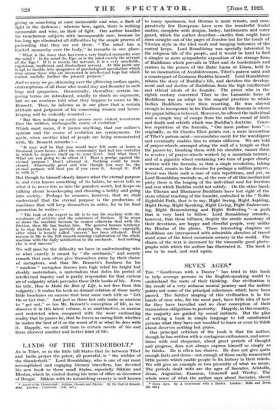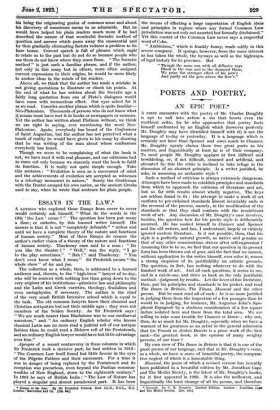SEVEN AGES.*
Tan " Gentleman with a Duster " has tried in this book to help average persons in the English-speaking world to understand the roots of their thinking. Our civilization is the result of a very arduous mental journey• and the author, points out some of the principal milestones which have been passed. The further shaping of this civilization is in the hands of men who, for the most part, have little idea of how far they have travelled and no clear conception of their tremendous obligations to posterity. Happily, in this country, the majority are guided by sound instincts. But the plan of writing a book in simple 'language to tell uninformed persons what they have not troubled to learn or even to think about deserves nothing but praise.
Our principal criticism of the book is that the author, though he has written with a contagious enthusiasm, and some- times with real eloquence, about great periods of thought and progress, does not always express himself so simply as he thinks. He is often too elusive. He does not give quite enough facts and dates—not enough of those easily memorized little points which enable people to fix history in their minds. We will give an example or two presently of what we mean. The periods dealt with are the ages of Socrates, Aristotle, Jesus, Augustine, Erasmus, Cromwell and Wesley. The whole sense of what the author says about Socrates, about • Seven Ages. By A Gentleman with a Duster. London : Mills and BOON pa. =LI his being the originating genius of common sense and about his diacoirery of conscience seems to us admirable. But he would have helped his plain readers much more if he had described. the nature of that wonderful Socratic method of queition and answer which parer; away the unessential and by thus gradually eliminating factors reduces a problem to its bare bones. Current speech is full of phrases 'which ought to relate us to the past but do not do_ so because people who use them do not know where they_come from. " The Socratic method " is just such a familiar phrase, and if the author, not only in this essay but in others, more often assigned
. .
current expreasions to- their origins, he would be more likely to anchor ideas in the _minds of" his readers.
Above all, we think that the author has made a mistake in not giving quotations to illustrate or clinch his points. At the end of what he has written about the Socratic age a fairly long quotation from one of Plato's dialogues would have come with tremendous effect. Our eyes ached for it as we read. Consider another phrase which is .quite familiar- Neo-Platonism. Thousands of persons who do not know what it means must hal-7e met it in books or newspaperS or sermons. Yet the author has written about Plotinus without, we think We are right in saying, ever Mentioning the word Neo- Platonism. Again, everybody hai heard of the Confessions of Saint Augustine, but the author has not perceived what a touch of reality he would have given to his essay by showing that he was writing of the man about whose confessions everybody has heard.
Though we seem to be complaining of what the book is not, we have read it with real pleasure, and our criticisms had to come out only because we sincerely want the book to fulfil its function. It is really not quite simple enough. Take this sentence : " Evolution is seen as a movement of mind and the achievements of evolution are accepted as witnesses to a teleology immanent in nature." Surely the Gentleman with the Duster escaped his own notice, as the ancient Greeks used to say, when he wrote that sentence for plain people.











































 Previous page
Previous page